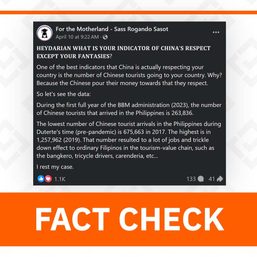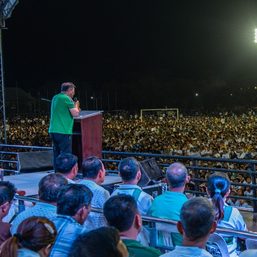SUMMARY
This is AI generated summarization, which may have errors. For context, always refer to the full article.
![[OPINION] Duterte, anti-terrorism, and dog whistling](https://www.rappler.com/tachyon/2020/09/dog-whistle-September-15-2020.jpg)
Exactly 3 days into the final two years of his term, President Rodrigo Duterte signed into law the highly contentious Anti-Terrorism Act of 2020 (ATA). This was after what critics have described as a “railroaded” passage of the bill, which received a sweeping vote of 173 in the House of Representatives despite appeals for its repeal.
In arguing for the passage of the ATA, administration-aligned representatives have come to use an identical framing: the law, said sponsor Puwersa ng Bayaning Atleta Partylist Rep. Koko Nograles, “is not anti-activism. It is for the prevention of terrorist attacks in the country.” According to Leyte 4th District Rep. Lucy-Torres Gomez: “I think we have to read the bill with the right target in mind. This bill is aimed to [sic] bring terrorists to justice. This isn’t about making life difficult for activists.”
Duterte himself said: “For the law-abiding citizen of this country, I am addressing you with all sincerity, do not be afraid if you are not a terrorist.” But he also admitted that for sure the law “will be challenged before the Supreme Court.”
Indeed, it is hard not to assume that Duterte, himself a lawyer who also served as city prosecutor, wouldn’t see any merit in allowing amendments on the contentious provisions of the law. Mere adoption of the Senate version of the bill by the House majority despite, again, experts’ claims that some of its provisions violate the Constitution, may also appear as counter-intuitive. Why pass a law that the Supreme Court would only likely declare as unconstitutional? Unless, the administration was too sure the measure will withstand the (impartial) scrutiny of the highest arbiter of the land.
The phenomenon, if viewed using traditional approaches to political scholarship, might seem irrational. From the perspective of political psychology, it might not be the case.
Political psychology holds important the agents involved in the analysis of any political outcome. Political elites’ motives and behaviors are seen as a function of their personality, beliefs, cognitive abilities, etc. which are both materially and socially shaped. Meaning, they can be gleaned upon the actors’ personal circumstances, participation in social circles, among others, as much as their political acts and performance. Hereafter, Duterte’s personal history with the Left might be useful to explain the passage of the ATA as a practice of dog whistling on the part of the administration.
A dog whistle is coded speech used to communicate a message towards a targeted group, while the rest of the general population remains unaware of it. In political discourse, it has come to be useful for political elites to appeal to particular segments of the public.
That Duterte had a long history of cooperation with the Left as mayor of Davao is an open secret. The president himself became a student of Communist Party of the Philippines (CPP) founder Jose Maria Sison when Duterte was still taking his undergraduate degree at the Lyceum of the Philippines. Sison said: “I am proud to say that President Duterte was my student in political science…. He became a member of the Kabataang Makabayan of which I was the national chairman.“
His personal bond with local communist leaders in Davao also made it easier for Duterte to restart the peace process with the Left when he assumed office. He also appointed Leftist leaders to his Cabinet and even requested the delisting of CPP-New People’s Army from the United States’ Foreign Terrorist Organizations list.
When Duterte suspended the peace talks in 2017, he cited as reason, at first, the NPAs’ continued state attacks despite ongoing negotiations. Later on, he said he could not accommodate anymore the Leftists’ “unrealistic” demand for a coalition government: “I used to listen to that god**** Sison. But there is a time na idealistic ka, there is a time na praktikal ka.”
At first, Duterte’s approach with the Left was that of accommodation. Reyes and Ariate cites an article by Carlos Zarate in 2003 that then Davao mayor Duterte even openly invited rebel groups to have their rest and recreation in the city “for as long as the city is spared any violent incident or skirmish.” Duterte was also appointed by former president Gloria Macapagal-Arroyo as an anti-crime consultant, but Macapagal-Arroyo “did not share the mayor’s accommodationist views.”
In the long run, Duterte’s accommodationist strategy with the Left proved to be costly because the president himself was also constrained by the structure that he has entrenched himself in. In the literal sense, he is constrained by time. In an attempt to revive the botched peace negotiations, Duterte ordered Labor Secretary Silvestre Bello III to talk to Sison, saying: “I’m sending him back to Sison and talk to him about (it) and you will know about it when the right time comes. If he agrees, this is what I will call my last card. When I say my ‘last card,’ my time is running out.”
Moreover, Duterte is constrained by resources. He often complained about the costs of arranging peace talks abroad, and the loss of good soldiers caused by alleged guerilla attacks.
But most importantly, the president is constrained by the alliances that he himself has formed over time. Duterte has made close ties with other political elites whose views on the long-standing armed conflict were not necessarily of accommodation. One of these is Macapagal-Arroyo, whose term, as described by Reyes and Ariate, is “remembered partly for a brutal anti-insurgency campaign…Oplan Bantay Laya, spearheaded by the likes of Major General Jovito Palparan.” It was Macapagal-Arroyo’s old hand and now Duterte’s national adviser, Hermogenes Esperon that also leads Duterte’s vicious National Task Force to End Local Communist Armed Conflict (NTF-ELCAC). Duterte said: “I used to provide moderation. Pero ngayon, ako na tapos ganito ang sitwasyon tatapusin ko talaga ito…. Just like drugs, dito sa giyerang ito destroy the NPA. Destroy the organization.”
The aforementioned constraints might have indeed influenced Duterte to pass a law that would finally enable government to go after its archnemesis once and for all, or it might be him playing dog whistle as a final attempt to strong-arm the CPP-NPA into yielding. If the case was, however, the latter, the message seems to have been poorly hidden. For the public who has seen one too many ordinary citizens persecuted under Duterte’s relentless drug war, the message could have well been directed at them. Moreover, the measure is reviving images of state-sponsored abuses committed under the dictatorship of Ferdinand Marcos, Sr. The result is heightened anxiety: both stirring people into action through online and street protests and also dampening the already bleak pandemic-ridden national psyche. Or, at least, these were what the political opposition has been painting perhaps in their own attempt at using rhetoric.
Leftist partylist Gabriela Rep. Arlene Brosas said: “Mr. Speaker, minadali ang panukalang ito dahil sa kumpas ng Pangulo, kahit pa ang kongkretong problema ngayon ay…kung paano malalamnan ang sikmurang kumakalam ng milyon-milyong Pilipino. Gusto ng gobyerno na matakot at manahimik na lang tayo…. Pero kumukulo na ang galit ng mga kababaihan at mamamayan.
“Harking it back to Marcos’ rule, she ended: “At sa tala ng kasaysayan, walang batas militar o diktador ang nakapigil sa pagsirit ng pagkilos ng mamamayan.” – Rappler.com
Judielyn Agua is a Political Economy graduate student at the University of Asia and the Pacific.
Add a comment
How does this make you feel?
![[OPINION] ‘Some people need killing’](https://www.rappler.com/tachyon/2024/04/tl-some-people-need-killing-04172024.jpg?resize=257%2C257&crop_strategy=attention)




There are no comments yet. Add your comment to start the conversation.